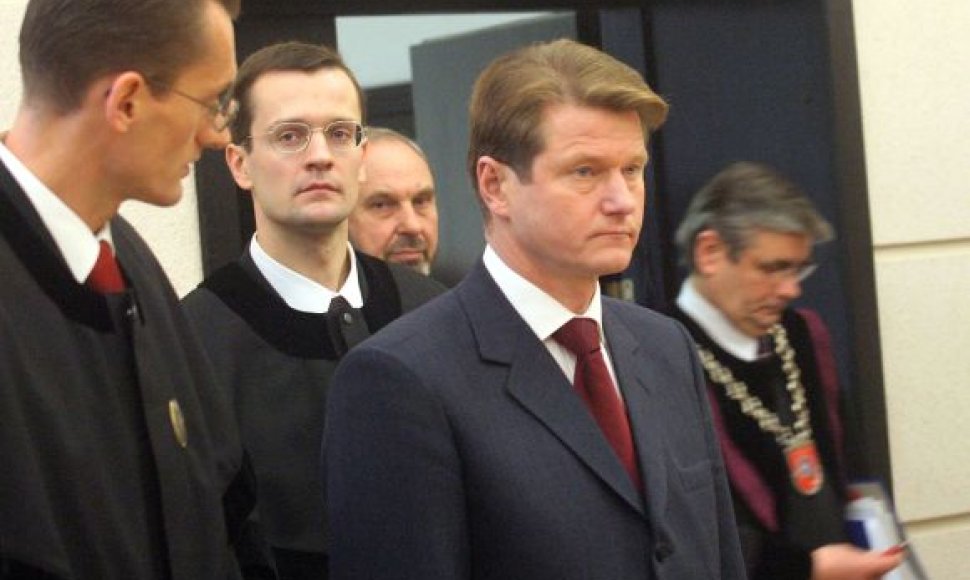65 MPs voted in favor of the amendment, 8 were against and 23 abstained. Political groups representing the Justice and Order Party, Labor Party, Christian Party as well as the Liberal and Center Union voted unanimously in favor of the amendments.
Meanwhile conservative MPs, excluding Speaker of the Seimas Irena Degutienė, who voted in favor, objected or abstained. A half of social democratic MPs, three members of the Liberal Movement political group voted in favor, and two abstained.
The parliament had debated two versions of the amendment that received initial backing. The parliamentary Committee on State Administration and Local Authorities decided that four years were enough to prevent impeached politicians from running for parliament. One proposal, the Committee had considered, provided for no sanctions, and the other proposed banning impeached politicians from parliament for 8 years.
The existing Law on Elections to the Seimas stipulates that a person, who has been removed from office by parliamentary impeachment or had his or her mandate revoked by the parliament, is banned from running for parliament indefinitely.
Critics of the new regulation say that amending the Law on Elections to the Seimas does not suffice, that a constitutional amendment has to be adopted too to implement the ruling of the European Court of Human Rights.
"The Constitutional Court has clearly said that the Constitution has to be amended. Otherwise, we'll not be able to overcome the Constitutional Court's ruling and the existing constitutional regulations by means of regular laws. But instead of making the right decision to amend the Constitution and solving this problem, we are shamefully procrastinating, we propose a law to solve something that has to be solved by amending the Constitution. So are we totally illiterate, do we not realize what we are doing, or are we engaging in populism? How long do we plan to hold Paksas hostage? Why can’t we amend the Constitution," social democrat Vytenis Povilas Andriukaitis said.
Earlier, Lithuanian Prime Minister Andrius Kubilius also expressed doubts whether amendments to the Law on Elections to the Seimas do not run counter to the country's Constitution.
"It's a constitutional problem, not a problem of four years. And I don’t know whether the proposal, the way it is now, complies with the Lithuanian Constitution and clarifications by the Constitutional Court. The government had submitted several proposals to the Parliament, a working group worked on the way to respond to the comments by the European Court of Human Rights on the issue, and all proposals were based on the fact that the Constitution has to be amended. It is on the Constitution that the Constitutional Court based its ruling against Rolandas Paksas, banning him from running for president for the rest of his life for breaching his oath," Kubilius said in an interview for the Žinių Radijas (News Radio) on Thursday.
"I have doubts as to whether it's possible to solve problems by not amending the Constitution. I would definitely want some analysis by the Constitutional Court following the adoption of such a law," he added.
Meanwhile conservative MP Kęstutis Masiulis, also critical of the adopted amendments, asked how many times in one's lifetime a person could break the oath following the introduction of the limited sanction. "I have always been and still am of the opinion that people should not have the opportunity to repeatedly break their oath and violate the Constitution. Now we are creating this opportunity. (..) Now a young person, who broke his oath, will be able to do that again every four years, if only he's energetic and successful enough in that particular sphere," Masiulis said.
The amendments will be relevant for two people only. One of them is Rolandas Paksas, leader of the opposition Order and Justice Party, former President and currently MEP, who was impeached and removed from the presidential office in 2004. The other is Linas Karalius, who was sacked from the parliament in 2010.
The Law on Elections to the Seimas is being amended after the European Court of Human Rights ruled last January that Lithuania violated the European Convention on Human Rights by banning Paksas from running for parliament indefinitely.
A group of lawyers had proposed three versions of the amendment and all of them involved correcting the Constitution. Based on the parliamentary proposal, the Constitution would not be amended.
Paksas will run for office
Lithuania's former President Rolansas Paksas, removed from office by impeachment in 2004, says he'll run for parliament.
"Yes, definitely," Paksas, currently a Lithuanian MEP, told BNS on Thursday.
He also confirmed that he might be put at the top of the election list of his party, Order and Justice. "I am the party's chairman, and naturally a party chairman has to be at the top of the list," Paksas said.
"It's a huge step towards restoring justice," the MEP said commenting on the parliament's decision. He added that efforts might be made to prevent him from running for parliament but that’s "no news".












